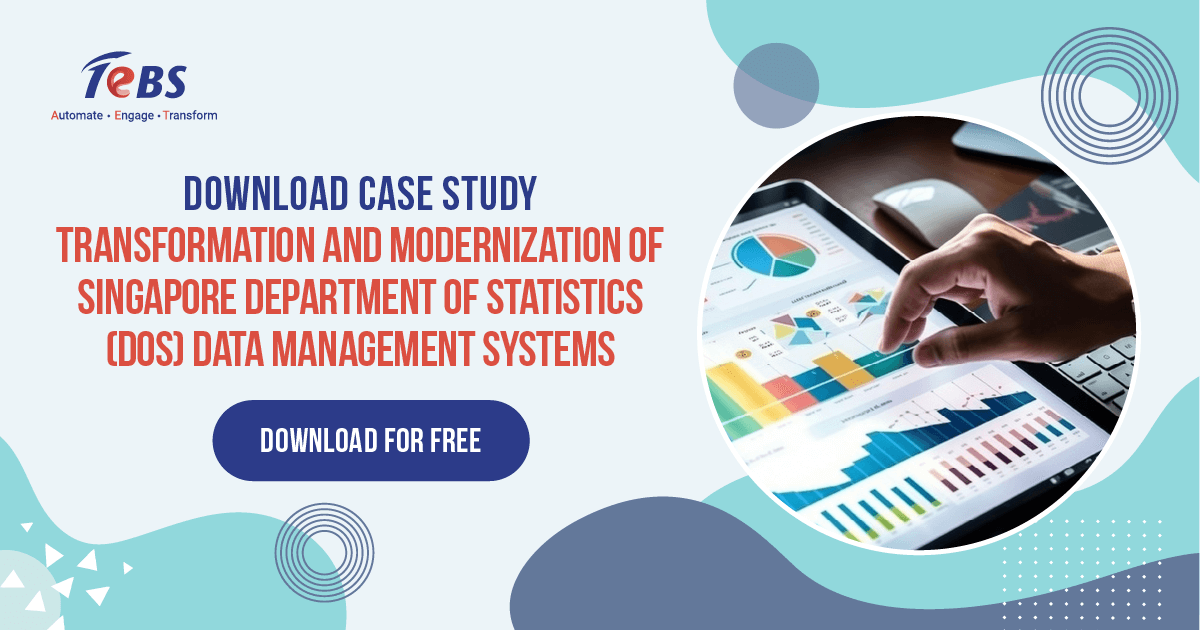The Singapore Department of Statistics (DOS) serves as the pivotal authority for collecting, analyzing, and disseminating statistical information in Singapore
CUSTOMER
Singapore Department of Statistics (DOS) – Singapore’s main statistical office for economic and socio-demographic data
REGION
Government Singapore Administration
APPLICATION
NET 9.0, MS SQL, ReactJs, HTML5/ CSS3/ Bootstrap, SSIS, SSRS, JAMS, PKI, ACM, Azure Vault, ETL, GPC, Azure GCC 2.0, AWS GCC+, R/Python script, R Studio workbench, Denodo,and Snowflake.
WHY TeBS?
- Expertise in App Development
- Focus on Agility and Innovation
- Experience with cloud and low code development
- Customized Approach
Organization Overview
The Singapore Department of Statistics (DOS) serves as the pivotal authority for collecting, analyzing, and disseminating statistical information in Singapore. It plays a critical role in providing a robust statistical foundation for policy formulation, planning, and research across various sectors. Its services are essential for public sector agencies, policymakers, international agencies, businesses, researchers, and the general public for understanding and responding to economic and social trends.
Challenges
1. System Modernization: The existing Trusted Centre (TC) system operated on the Government Private Cloud (GPC), which limited scalability, flexibility, and integration capabilities needed for modern statistical services.
2. Data Integration and Management: There was a need for seamless integration with newer data analysis tools and APIs, including CAM API, Marvel, and R Studio Work Bench, to enhance data analytics and reporting capabilities.
3. Infrastructure Reliability and Security: Ensuring the highest levels of data security and system availability was paramount, given the sensitivity and importance of statistical data.
4. Maintenance and Support: The DOS required a comprehensive application maintenance and support framework for the TC and Enterprise Data Hub (EDH) to ensure uninterrupted services.
The Solution
A multi-phased approach was proposed and implemented by TeBS to address the DOS’s needs comprehensively:
1. Migration to AWS GCC+: The Trusted Centre (TC) system was migrated from the GPC to Amazon Web Services (AWS) GovCloud (GCC+). This move leveraged AWS’s scalable, flexible, and secure cloud computing environment, specifically designed to address the needs and compliance requirements of government agencies
2. System Integration and Modernization: The integration of CAM API, Marvel, and R Studio Work Bench on a Linux platform was undertaken to enhance the analytical capabilities of the DOS. This integration facilitated advanced data analysis and visualization, supporting more insightful and timely statistical reports.
3. Customized Application Maintenance & Support: A tailored application maintenance and support strategy was designed and implemented. This included regular system updates, security patches, and 24/7 support to ensure the reliability and security of the TC and EDH systems.
4. Training and Knowledge Transfer: Comprehensive training sessions and documentation were provided to DOS staff to ensure smooth adaptation to the new systems and tools, empowering them to leverage the full potential of the modernized infrastructure
Benefit
1. Enhanced Data Security and Compliance: Migrating to AWS GCC+ significantly improved the data security posture of DOS, aligning with stringent government data handling and privacy regulations.
2. Improved System Performance and Scalability: The modernized infrastructure offered improved performance and scalability, enabling DOS to manage larger datasets more efficiently and effectively.
3. Advanced Analytical Capabilities: With the integration of advanced data analysis tools and APIs, DOS could now undertake more complex and nuanced statistical analyses, enhancing the quality and depth of insights available for decision-makers.
4. Operational Efficiency: The comprehensive maintenance and support framework ensured high system availability and reliability, reducing downtime and operational disruptions.
5. Future-Ready: The modernization project not only addressed the current needs of the DOS but also laid a solid foundation for incorporating future technological advancements and analytical tools, ensuring the department remains at the forefront of statistical service provision.
This project stands as a benchmark in government digital transformation, showcasing how strategic technologypartnerships can significantly enhance operational capabilities and service delivery in the public sector.





